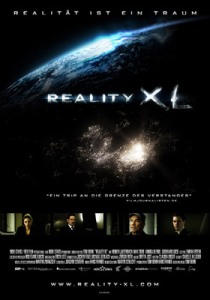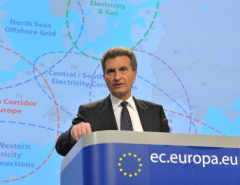
EC energy commissioner Günter Oettinger © European Commissio
On December 15th of 2011, the European Commission released the 2050 Energy Roadmap, which includes several scenarios. The roadmaps can be seen as a guideline for governments considering the decision making processes in the frame of the question: “What should EU´s governments invest in: Conventional fuels or renewable energy?”
Greenpeace EU energy policy adviser Frauke Thies states on the EU 2050 Roadmap as follows: “The roadmap shows that, no matter how Europe wants to develop its energy system, we need to boost renewable energies, save energy and make the power network more flexible. These three elements should be the focus of the European governments ‘efforts. The roadmap also demonstrates that coal and nuclear energy are irrelevant. They have no future and governments should stop wasting time and money on them.”

Spanisch pictorial health warning
While the responses of the energy industry, as mentioned in various articles of European Energie Review´s Online-Journalist Karel Beckman, have been quite positive, the green lobby groups are generally more critical. Europia e.g. comments positively on the roadmap for recognizing the fact that “energy costs are an important factor for industry”. Most of the renewable energy and climate lobby groups, such as EREC (European Renewable Energy Council), the ECF (European Climate Foundation) and EEB (European Environmental Bureau) besides others, do acknowledge that energy efficiency is a “key ingredient” in the Roadmap . But also the majority of the green energy lobbyists have their doubts, if this conclusion will be transformed finally into concrete measures and guidelines.
Concerning other issues, EU´s position is clearer. As history shows, industrial lobbyist´s arguments have almost been as impressive as their smartest statements in the currently most valuable currency. Considering the tobacco industry as an example, the big majority of governmental policies, have been increasingly restrictive during the last decades with reference to tobacconists advertisements, sponsoring, package design and price policies. As BBC news states, the latest achievement of the European Commission in this context is the Tobacco Products Directive concerning new pictorial health warnings that will cover up to 40% of cigarettes package´s backside. These health warnings will soon be required mandatory among several European countries. Beyond doubt, tax revenues on tobacco are considered to be an important income for governments, and this also notably in the European Union. That should not be underestimated. Even global industrial players are facing times of changes, but unfortunately some are still more equal than others. With other words, even in times of gloomy prospects, capitalism follows still its evident and quite simple rules. But beside all economic disasters, the word crisis comes from the Greece word “krísis” and describes a decision making process or a divorce, as it refers to and height or turning point of a dangerous development. Nevertheless, for the above mentioned industry, bad public relations have increasingly become more valuable during the last decades. Bad public relations are even appreciated by this industry, for the purpose of having any PR. However, the efforts of the European Commission concerning the pictorial health warnings are adequate prevention tools and could be considered as contemporary policy strategies, as they show that things can change.
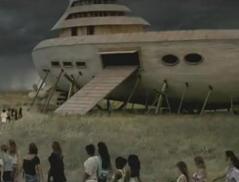
Noah´s Ark in the current Axe tv spot
Facing the current challenges in EU climate policies, the actual Axe advertisement that alludes to the biblical saga of Noah´s Ark, could be helpful in order to underline the significance and acuteness to translate the conclusions of EU´s 2050 Energy Roadmap, that energy efficiency is indispensable, into sufficient concrete action. In the advertisement a young men invites a mass of attractive women on his mystical boat, where they are waiting for the flood to come. The advertisement refers to the end of the Maya calendar on December 2012. The European Union is threatened by the risk of another intense recession among its member states. Climate changes make it even more urgent to boost renewable energy, and Fukushima has become a symbol for nuclear power´s threats.
Despite the fact, that EU policy is risking a recession by inverting to less in employment relevant industry sectors, and so provoke the increase of the current downward tendency, the WWFs doubt, that ´Oettinger´s roadmap will remain a pure think piece if not backed by effective legislation`, illustrates that Europe needs more political pragmatism and shorter decision making processes. Is it worth to risk, that more adolescents are getting addicted to tobacco industry´s products? The European Commission´s answer is “No!” In this spirit, should the EU and its governments, under the so-called Franco-German co-leadership Merkosy, invest more in photovoltaic solar power plant through EU subventions in regions such as Brittany and Bavaria? Or should we, as Europeans are willing to reform our structures and thinking, intensify photo voltaic investments in Macedonia and Andalusia, where sun is shining almost the whole year? Could we promote investments, joint ventures in these sectors and by that also promote Europe´s labor market and attractiveness for other industries? Could the application of pragmatism in the frame of Europe´s energy policy, bring the European Union closer to the prestigious goals of the EU´s 2050 Energy Roadmap and an effective energy mix? Would a European legislation be able to manage EU´s energy issues? Or would this just be absolutely illusive?
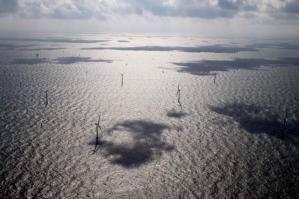
The Princes Amalia offshore wind park
On the other hand side, strategically good examples for pragmatism in cross governmental energy projects are the Princes Amalia wind farm in Holland, new wind park projects in Cantabria initiated by the Spanish “Iberdrola Renovables” and the German off shore wind park Alpha Ventus, as those investments are or will be installed in regions where they can work effectively. They are milestones on Europe´s way to a sustainable energy mix. Despite the fact, that Europe will not be able to solve the carbonization problem in a solo attempt, EU´s pioneer spirit could be an adequate response to the current EU crisis, if worlds are put into action. Without losing sight of competitiveness in energy costs, the EU´s 2050 Energy Roadmap could become the next turning point in Europe´s history and possibly the beginning of the recovery of Europe´s common identity, by stabilizing EU´s economic position in the near future. This could be reached by the definition and implementation of smaller milestones in EU´s common energy policy, measures that strengthen in this context Europe´s labor markets and policies that increase EU´s attractiveness among investors. In order to reach these goals, a common European governmental strategy could be essential.
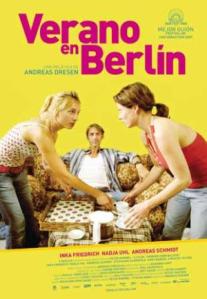 Ocasionado por el Día Internacional de la Mujer, el –en los medios de comunicación en España omnipresente e inquietante- fenómeno de la violencia masculina doméstica, la polémica de la igualdad de los géneros y –a la escala personal- mi profundo respeto y inagotable amor por las personas, dedico este artículo a todas las mujeres del mundo, y particularmente a algunas españolas en concreto. Según informa la UE en el Eurobarémetro sobre igualdad de géneros, opinan 74% de los españoles que la agresión contra las mujeres es el principal problema, y que representa un bloqueo frente a la igualdad de géneros.Al contrario solo 27% de los alemanes estiman que la violencia doméstica sea el origen de la desigualdad. Desde luego, la violencia doméstica es un fenómeno alarmante y demuestra el triste desamparo emocional de algunos varones.
Ocasionado por el Día Internacional de la Mujer, el –en los medios de comunicación en España omnipresente e inquietante- fenómeno de la violencia masculina doméstica, la polémica de la igualdad de los géneros y –a la escala personal- mi profundo respeto y inagotable amor por las personas, dedico este artículo a todas las mujeres del mundo, y particularmente a algunas españolas en concreto. Según informa la UE en el Eurobarémetro sobre igualdad de géneros, opinan 74% de los españoles que la agresión contra las mujeres es el principal problema, y que representa un bloqueo frente a la igualdad de géneros.Al contrario solo 27% de los alemanes estiman que la violencia doméstica sea el origen de la desigualdad. Desde luego, la violencia doméstica es un fenómeno alarmante y demuestra el triste desamparo emocional de algunos varones. Un día aparece el príncipe Ronald en la vida de Nike. Entonces, Nike entra con Ronald en otra etapa primaveral, mientras se cambia también la banda sonora de la vida de Katrin: ¿Y si el príncipe azul no hubiera aparecido? ¿Habría dormido Blancanieves eternamente en su ataúd de cristal? Verano en Berlín: un filme como la vida misma.
Un día aparece el príncipe Ronald en la vida de Nike. Entonces, Nike entra con Ronald en otra etapa primaveral, mientras se cambia también la banda sonora de la vida de Katrin: ¿Y si el príncipe azul no hubiera aparecido? ¿Habría dormido Blancanieves eternamente en su ataúd de cristal? Verano en Berlín: un filme como la vida misma.